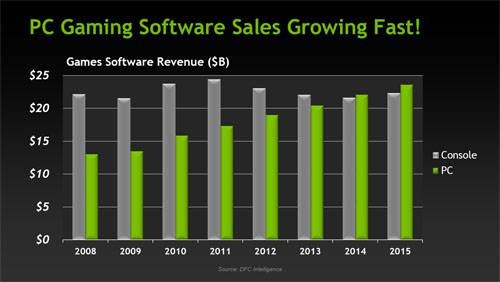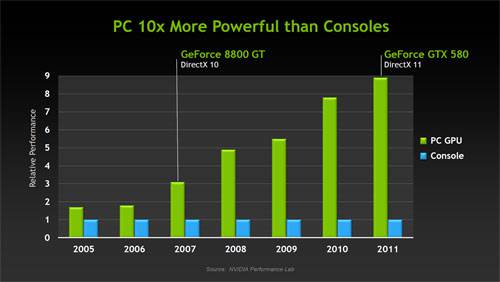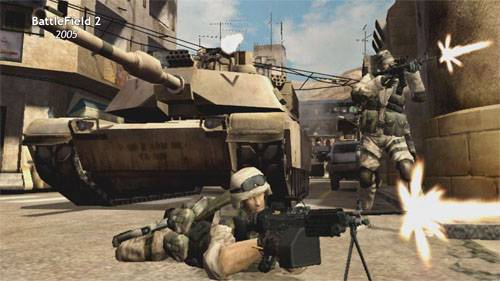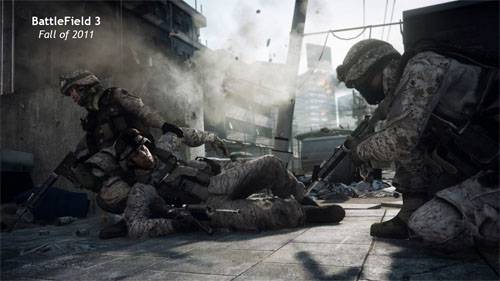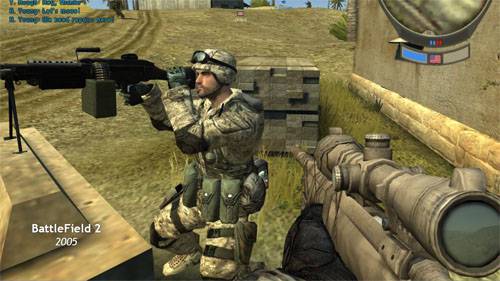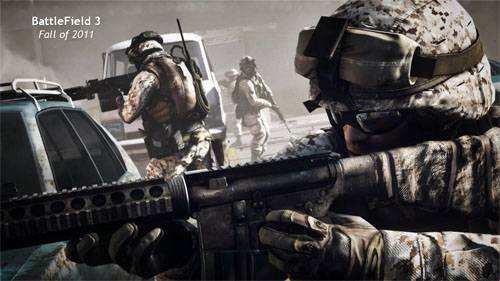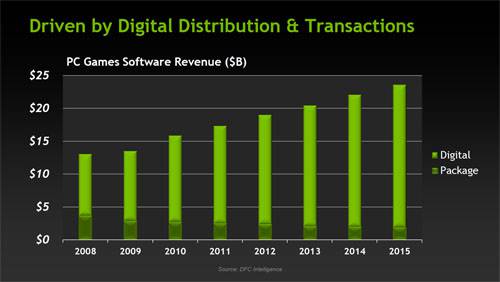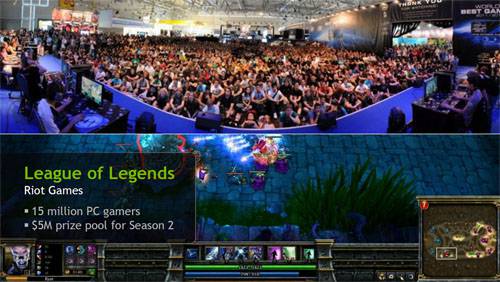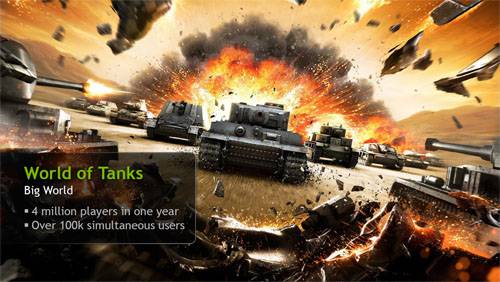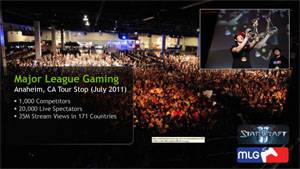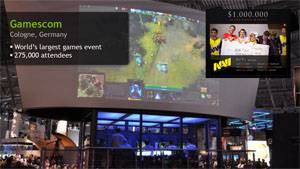- Qualcomm Launches Snapdragon 4 Gen 2 Mobile Platform
- AMD Launches Ryzen PRO 7000 Series Mobile & Desktop Platform
- Intel Launches Sleek Single-Slot Arc Pro A60 Workstation Graphics Card
- NVIDIA Announces Latest Ada Lovelace Additions: GeForce RTX 4060 Ti & RTX 4060
- Maxon Redshift With AMD Radeon GPU Rendering Support Now Available
NVIDIA Talks PC Gaming Trends
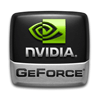
Some claim that PC gaming is dying, but recent trends disagree. In fact, it looks to be console gaming that’s soon to see a decline, thanks in part to a growing number of compelling aspects that PCs offer – including at the very least free-to-play games. Let’s take a look at these and other trends, and the reasons behind them.
During an NVIDIA conference call, a couple of interesting tidbits were disclosed that adds some fuel to the ‘PC vs. Console’ fire – and for once, they work to the favor of PC gamers. Would you believe that by 2014, PC game sales are expected to surpass console game sales?
I am not sure when the transition happened that had console games surpass PC games in sales, but it’s been a long time – something I am often baffled by. So given this, the fact that the trends look to reverse is quite interesting, but not without reason.
In this quick article, we’re going to take a look at some of the trends NVIDIA and its sources are predicting, and also take a look at some of the reasons (and potential reasons) why they’re likely to hold true.
“What defines a ‘PC’?” is a question that came to mind after seeing this graph, but it appears that it’s just what we think it is… a PC; desktop or notebook. Mobile gaming products such as tablets and smart phones are not included in this forecast (likely a good thing, as I’m sure it’d put a damper on things).
The Xbox 360 was released in 2005, and both the PlayStation 3 and Wii were released in 2006. That means that there’s been a full five years since the last current console was released, so it’s almost not hard to understand why PC gaming could begin to go on the rise. After all, while Nintendo announced its next console, the Wii U, it’s not impressive performance-wise, and neither Microsoft nor Sony have given the vibe that either are close to an announcement for their own upcoming consoles.
Rumors also have it that next-gen consoles from both Microsoft and Sony may not be exactly what we expect, and for some, whatever changes are entailed might not be classified as good changes to the average gamer. One thing’s for sure though – PC gaming’s allure is greater than ever, for a multitude of reasons (reasons that could fill an article on its own).
Here’s a great one:
When the Xbox 360 was released in 2005, it offered some sweet graphics for the time, but capabilities-wise, PCs were still about 40% faster. Since the current crop of consoles haven’t budged in terms of performance, NVIDIA said that the current crop of GPUs make the PC up to 10x as powerful as consoles – and in some regards, I’d be willing to bet that delta could increase even more.
If Microsoft or Sony release a new console next year, or the year after, they’re both likely to blow their predecessors out of the water in terms of graphics and other features. But we’re still going to face the problem of the last generation, where PCs are going to be more capable from the get-go, and will only get better as time passes.
Let’s put those facts to pictures. Below are four images, in the order of old-new-old-new, including Battlefield 2, released in 2005 (the same year as the Xbox 360), and Battlefield 3, to be released next month. There’s just no comparison. The latter has far greater texture detail, good use of ambient occlusion, depth-of-field and lighting techniques, while the former just looks… well, out-dated.
For development of Battlefield 3, EA set out to make the PC the best platform possible to experience the game. Patrick Bach, EA’s Executive Producer for the game has said, “PCs are way more powerful than consoles today. We’re aiming to use the PC to set the bar.” As a result, BF3 is using an entirely different lighting engine than the one consoles will see, and of course, DirectX 11 is also being added into the mix, among other capabilities (larger maps, more players per map).
We must ask – where will we be six years from now? Will we be greeting Battlefield 5 and looking back at Battlefield 3, wondering what we were so impressed about?
Another interesting statistic that NVIDIA raised is this one:
As of 2008, boxed copies of games had paltry sales compared to digital sales, and nothing at all looks to change. During 2011, nearly $15 billion is going to be attributed to digital sales while $2.5 billion belong to boxed copies. This is a trend I have to admit I am not surprised by. I’ll never purchase another boxed copy if I can help it.
The death of PC gaming has long been a mocking-point of console gamers, but recent trends show that the PC has nothing to stress over. One such trend is free-to-play, where games are inherently free, but support paid-services such as purchasing in-game items. This has proven wildly successful, and has even caused the odd MMORPG to get rid of it subscription fee. It’s also caused a lot of games to be developed with the F2P mechanic decided from the get-go.
League of Legends is one good example. With a reported 15 million gamers worldwide, there are more people playing it than World of Warcraft. Games like these just don’t work that well on consoles (where the bulk of the profits are the result of off-the-shelf games), but on the PC… they’re thriving. Even Valve has jumped on the bandwagon by regularly releasing free-to-play games on its Steam platform.
One of the biggest pluses of the PC is modding, and without it, games like League of Legends and Defense of the Ancients may not even exist. There are over 15 million playing LoL and I’m sure the numbers are comparable with DoTA, Heroes of Newerth and the ton of other free-to-play games.
I admit I am not a fan of the free-to-play mechanic, but there’s little denying that it’s done well to surge interest in PC gaming, which should as a whole help the platform – and based on the trends shown in the top-most graph, it already has. Not only are these games popular, but competitions are regularly held that offer million-dollar prizes. In one of the below photos, a room filled with 20,000 game spectators is shown, watching a StarCraft II competition, with a mention that 35 million gamers were streaming the event from 171 different countries.
I think it’s safe to say that PC gaming is alive and well, regardless of how it’s being accomplished. Now if you don’t mind, I’m going to go indulge in some high-resolution gaming.
Discuss this article in our forums!
Have a comment you wish to make on this article? Recommendations? Criticism? Feel free to head over to our related thread and put your words to our virtual paper! There is no requirement to register in order to respond to these threads, but it sure doesn’t hurt!
Support our efforts! With ad revenue at an all-time low for written websites, we're relying more than ever on reader support to help us continue putting so much effort into this type of content. You can support us by becoming a Patron, or by using our Amazon shopping affiliate links listed through our articles. Thanks for your support!




